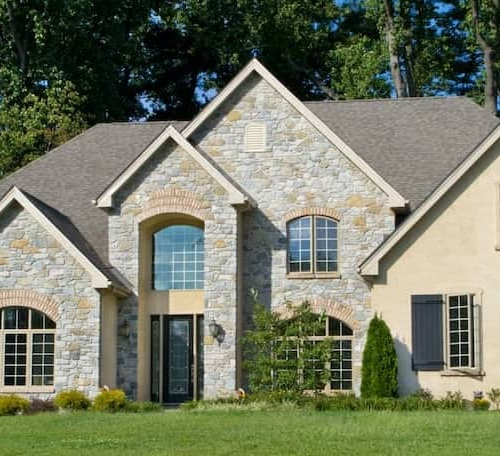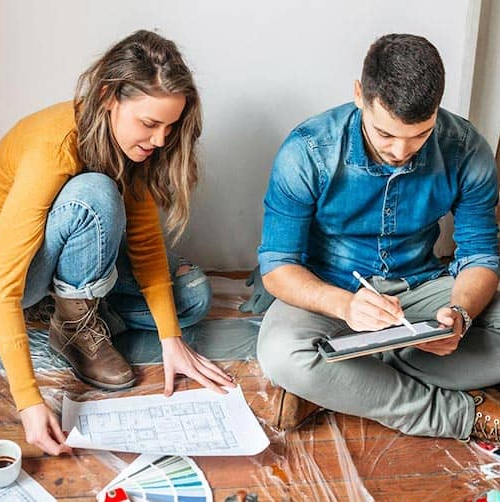What is the average square footage of a house?
Contributed by Karen Idelson
Jan 13, 2026
•5-minute read

One of the key factors in both the buying price and ongoing value of a home is its square footage. In general, the bigger the home, the more it’s worth.
For many years, home sizes were increasing, though that trend has been reversing in recent years. Buying a large home can be good for some people, but others would prefer to buy smaller houses. We’ll cover trends in home sizes and how to decide what size home is right for you.
What is the average size of a house?
According to the U.S. Census Bureau, the average home built in 2024 had a square footage of 2,367 square feet. However, like anything in the world of real estate, it’s all about location. Homes in some areas tend to be larger than in other areas. For example, the average new construction home in the Northeast was 2,590 square feet and just 2,242 square feet in the Midwest.
Reasons for this are many, including the cost of construction, local market trends and taste, and availability of space. Knowing what is typical for your area can be helpful when trying to decide where to buy a home.
A look at the history of home sizes
For many years, homes tended to get bigger. Of homes built in 1960 or earlier, the median square footage is 1,500. By comparison, the median home built between 2005 and 2009 was 2,200 square feet.
This explosion in home sizes may be somewhat to blame for the high cost of housing. In 1980, homes in most parts of the country tended to cost about 3-4 times the median income, with some expensive areas reaching multiples as high as 8.
By 2022, multiples of 5 to 8 were the norm in more densely populated regions, with multiples of 10 or more in high-demand areas such as Southern California.
This trend has reversed to an extent. The average size of a home began to fall in 2009 in the wake of the Great Recession before it began climbing again. Since about 2014, average home sizes have once again begun to fall.
The benefits of buying a home with more square footage
If you’re in the market to buy a home, there are some good reasons to buy a larger home.
Consumer demand
Home builders tend to follow consumer desires and trends. The reasons homes have gotten so much bigger over the past fifty or so years are that people want larger homes with features like walk-in closets, en suite bathrooms, and other amenities that take up space.
Buying a larger home can help you sell your home more quickly and get a better price when it comes time to sell.
Room to grow
Larger homes tend to be popular with people who hope to start a family and want room to grow. If you’re considering having kids, a larger home can save you from moving when you do add to your family.
More room also means more space to add things you may want later in life, like a home office or gym.
The drawbacks of buying a home with more square footage
Buying a larger home isn’t a no-brainer. You do have to consider some downsides.
Higher costs for maintenance, repairs, and taxes
The larger your home, the more you have to budget for maintenance, repairs, and taxes. More space in the home simply means more space to maintain and keep in working order.
Some examples of things that will likely cost more when you own a larger home include:
- Cleaning services
- Roof installations
- Flooring charges
- HVAC capacity
- Property taxes
Farther from urban centers
In general, homes near major urban centers tend to be smaller than those in the suburbs or rural areas because space is at a premium. If you want to live near a city for work or access to its amenities, you may have to pay a big premium for more space or forgo having a large home.
Higher energy costs
Larger homes take more energy to light, keep warm in the winter, and keep cool in the summer. You’ll pay more for things like electricity, natural gas, and possibly water.
Inefficient use of available space
Some large homes make good use of their space by including useful amenities, but others may use the space inefficiently, giving you a larger kitchen or living room than you actually need. You could wind up overpaying for more home than you use.
Uncertain resale value
Homes have generally grown larger over time, but that trend has started to reverse somewhat in recent years. You may find that when it comes time to sell, people are looking for slightly smaller homes, making it more difficult for you to find a buyer.
What size is right for you?
If you’re trying to determine what type and size of house is right for you, ask yourself these questions.
How much house can you afford?
The most basic question to ask is how much home you can afford. There’s no point in looking at big homes if you can’t afford to make a down payment or pay the monthly mortgage bill. Consider costs, including your mortgage, utilities, and maintenance.
You can use a mortgage calculator from Rocket Mortgage® to estimate the monthly payment associated with a home based on its list price, which can help you hone in on the size of home you can afford.
How long do you plan on living in the home?
How long you plan to stay in the home also influences the size of the home you need. If you’re buying a starter home you plan to only keep for a few years, a smaller home is fine. If you want a property to keep for decades, you’ll likely appreciate more space.
Do you plan to grow your family?
If you want to grow your family, you might aim for a larger home so that you have the space to add new members to your family comfortably and without feeling cramped.
Do you plan to share your home with other family members?
Whether you plan to share with other family members as soon as you buy or foresee a future when your parents or in-laws might want to move in, you might consider buying a larger home if you expect to be adding more residents than just your immediate family.
In some cases, you might be able to buy a smaller home and later build an accessory dwelling unit, though this will require some free space in your backyard or elsewhere on your plot of land.
Do you and your spouse plan to stay in the home?
If you’re buying your home for the long term, think about how you and your spouse will handle the home as you age. Generally, older people don’t need quite as much space as a younger family.
Consider whether a ranch or a bungalow-style home with the master bedroom and common areas on the same floor may be right for you.
How much outdoor space will you need?
How much do you value having access to a yard? If you have pets, like to entertain by hosting cookouts, or want space for a child’s swing set, you’ll likely want a larger home because they often come with more outdoor space.
The bottom line: Understanding the average size of a house
The size of a home plays a big role in how much it costs, with larger homes tending to cost more. Your budget and your mortgage approval amount will be big factors in the size of home you buy, but it’s important to consider other factors, such as how much space you really need and how long you’ll keep your home.
If you’re ready to begin the homebuying process, you can get started by applying for a mortgage with Rocket Mortgage®.

TJ Porter
TJ Porter has ten years of experience as a personal finance writer covering investing, banking, credit, and more.
TJ's interest in personal finance began as he looked for ways to stretch his own dollars through deals or reward points. In all of his writing, TJ aims to provide easy to understand and actionable content that can help readers make financial choices that work for them.
When he's not writing about finance, TJ enjoys games (of the video and board variety), cooking and reading.
Related resources
5-minute read
Price per square foot: Why it matters and how it's calculated
A home’s price per square foot is calculated by dividing the listing price by the home’s square footage. Learn more about this metric and why it mat...
Read more
6-minute read
10 best places to build a house during the 2021 building boom
Are you interested in building a house on a budget? Learn about the 10 cheapest places to build a house in 2023 and other factors to consider when building.
Read more

8-minute read
How much does it cost to renovate a house?
The amount it costs to remodel a house can vary depending on the scale of the project. Learn the average costs associated with various kinds of remodels.
Read more